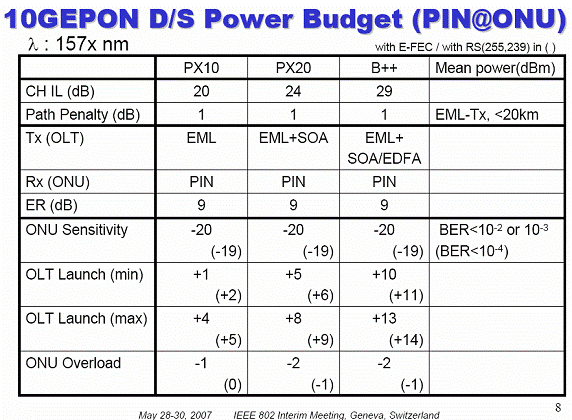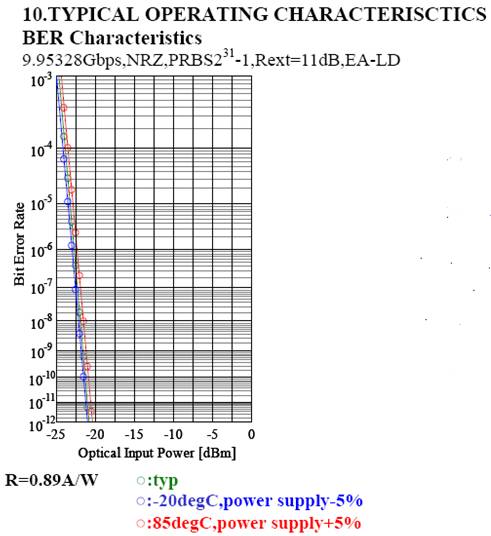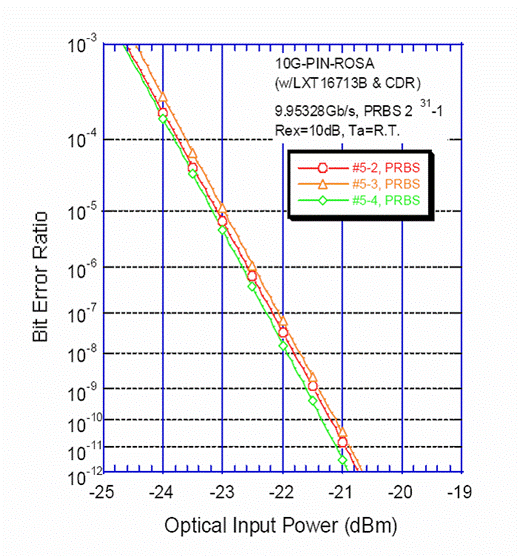All,
The 1e-12 BER PIN sensitivity that is
being used in the slide below is -16 dBm.
The slide says that the 1e-4 BER
sensitivity is -19 dBm.
The slide says that the 1e-3 BER
sensitivity is -20 dBm.
What Bidyut is noticing is that many
receivers he is casually looking at on the web seem to have a much better
sensitivity curve than what this slide says. The typical sensitivity
numbers are -20dBm, and I’d believe that the ‘hard spec’
would be about -18 dBm. I’ve been saying the same thing for many
months. But “team PIN” seems convinced on -16 dBm, for
reasons of economy and yield, I’ve been told. But that is a matter
of how aggressive you want to be with the specification….
Sincerely,
Frank E.
From: Bidyut Parruck
[mailto:Bidyut@CORTINA-SYSTEMS.COM]
Sent: Wednesday, August 29, 2007
6:05 PM
To:
STDS-802-3-10GEPON@listserv.ieee.org
Subject: Re: [8023-10GEPON] PIN-PD
Power Budget
Hi Ryan,
I’m not
sure where the FEC numbers are baked in. Here’s the slide 8 from
3av_0705_takizawa_1.pdf.
Bidyut

From: Ryan Hirth
[mailto:ryan.hirth@TEKNOVUS.COM]
Sent: Wednesday, August 29, 2007
2:10 PM
To:
STDS-802-3-10GEPON@listserv.ieee.org
Subject: Re: [8023-10GEPON] PIN-PD
Power Budget
Bidyut,
The additional gain from operating at BER
10E-12 to 10E-3 in your example is the FEC optical gain. You cannot
increase the receiver sensitivity and add gain for FEC since this would be
adding in the same gain factor twice.
Regards,
Ryan Hirth
Director of ASIC Engineering
Teknovus Inc.
From: Bidyut Parruck
[mailto:Bidyut@CORTINA-SYSTEMS.COM]
Sent: Wednesday, August 29, 2007
1:31 PM
To:
STDS-802-3-10GEPON@listserv.ieee.org
Subject: [8023-10GEPON] PIN-PD
Power Budget
I have been looking at publicly available 10Gbps PON photodiode
datasheets from major suppliers. For the receiver sensitivity, they all claim
-21 dBm for BER of 1x10E-12. The typical characteristics curve suggests a BER
of 1x10E-3 for input power level of -25 dBm.
With input BER of 1x10E-3, we can find FEC algorithms which would
provide output BER of 1x10E-12 or better. Excuse my ignorance of the subject,
but why can't we use -24 dBm as the receiver sensitivity for PIN-PD receivers?
That will give us an additional 4 dB.
Here are some examples:

